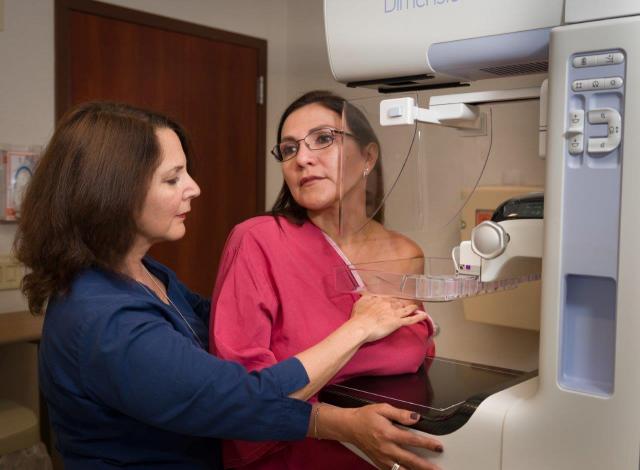Early Detection Saves Lives
Many cancers are treatable if caught early. Catholic Health cancer experts encourage patients to schedule the necessary cancer screenings for their age, gender, familial and genetic history, and other contributing risk factors.
The odds of successful treatment greatly improve when cancer is diagnosed at its earliest stage. Our compassionate cancer team, including board-certified oncologists and oncology surgeons, will explain all your options, listen closely to your needs, and answer your questions before putting a tailored treatment plan into action.
Recommended Screenings
Catholic Health's preventive cancer screenings are offered at locations across Long Island, including physician practices, hospitals and Catholic Health Cancer Institutes. Talk to your physician to determine when, and how often, you should schedule your screenings.
Call 844-86-CANCER (844-862-2623) to find a physician near you.
The U.S. Preventive Services Task Force (USPSTF) has recommended all women start routine breast cancer screening at 40. The previous recommendation was by the age of 50.
The USPSTF guidelines are for women at average risk, not those at high risk due to factors like genetic history or previous breast cancer.
Cervical cancer screening includes the Pap test or Pap smear and testing for the human papillomavirus (HPV). Screenings may consist of HPV testing alone, called primary testing, or a combination of HPV and Pap tests.
- Women at average risk should begin cervical cancer screening at 25 years old.
- Women between the ages of 25 and 65 should have a primary HPV test every five years.
- If primary HPV testing is not available, screening should consist of combination HPV and Pap testing every five years or a primary Pap test every three years.
- Women over the age of 65 with no history of abnormal test results after 10 or more years of testing should not be tested for cervical cancer.
- Women who have had a total hysterectomy where the uterus and cervix were removed should stop screening unless the surgery was done as part of cancer treatment.
Catholic Health offers several options for colorectal cancer screening, including colonoscopy, flexible sigmoidoscopy or CT colonography.
- If you're age 45 or older and have an average risk of developing colorectal cancer, you should get screened regularly.
- If you are at increased risk for colorectal cancer, talk to your physician to determine at what age you should begin screenings and which tests are appropriate for you.
Catholic Health offers lung cancer screenings with low-dose CT scan technology for patients with a high risk of lung cancer.
Screenings are recommended if you are between 50 and 80 years old (U.S. Preventative Services Task Force guidelines) and are a current smoker or quit within the last 15 years.
Although a single test does not exist for screening, your doctor may recommend the following if you have certain risk factors or are showing signs and symptoms.
- Blood test to measure the level of CA-19-9 proteins
- Endoscopic ultrasound and/or MRI
- Genetic consultation and/or testing
- Periodic evaluation
All men should talk to their physicians about the risks and benefits of prostate cancer screening to determine what age testing should begin.
- Men age 50, at average risk for prostate cancer who have a life expectancy of at least ten years, should talk to their physician about screening and whether it’s right for them.
- African American men and men who have a father or brother who had prostate cancer before age 65 should talk to their physician to determine if screening is appropriate.
- Men who have multiple family members who had prostate cancer before age 45 should talk to their physician about the pros and cons of early testing.
Although there are no official screening guidelines for skin cancer, you should become familiar with checking your skin and monitoring it for changes that could indicate cancer.
- Check your skin monthly and learn the pattern, shape and size of moles, blemishes, freckles and other marks.
- Talk to your physician about your risk of skin cancer to determine if you need regular exams to assess your risk.
- Talk to your physician about scheduling an appointment with a dermatologist who will thoroughly examine your skin.
Schedule Your Mammography Today
Catholic Health is committed to the diagnosis, treatment and prevention of breast cancer. We know that breast cancer screening saves lives, and it may be time for you—or a loved
one—to be screened.
We offer convenient locations in Nassau and Suffolk counties.
- The Women’s Health Center of St. Francis Hospital & Heart Center® (Roslyn, NY)
- Bishop McGann Women’s Imaging Center at Mercy Hospital (Rockville Centre, NY)
- Good Samaritan Hospital Women's Imaging Center (West Islip, NY)
- Siena Women’s Health Outpatient Diagnostic Pavilion (Smithtown, NY)
- St. Catherine of Siena Diagnostic Imaging (Smithtown, NY)
- St. Charles Hospital Radiology (Port Jefferson, NY)

Clinical Excellence. Compassionate Care.
Cancer Services
Diagnosis and treatment for all types and stages of cancer.
Cancer Treatments
Catholic Health offers advanced treatments and support services.
Catholic Health Cancer Institutes
Comprehensive cancer services at locations across Long Island.

